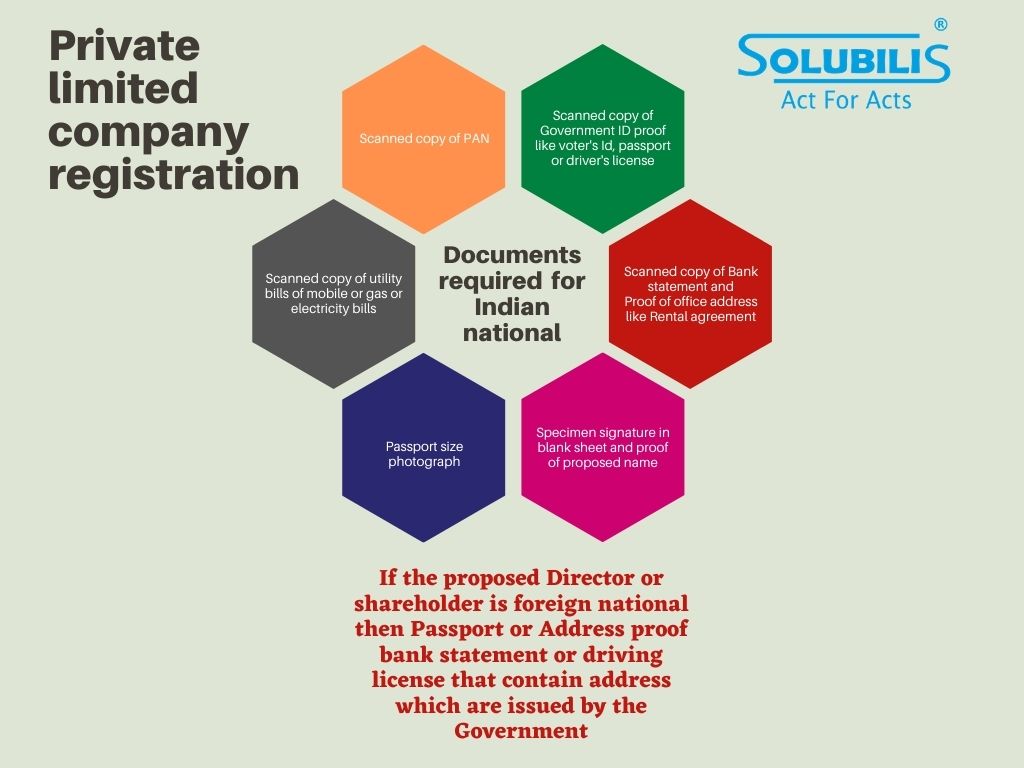A Private Limited Company is a type of business structure in India which holds many benefits over any other form of business structure in our country. Furthermore, as per records, about 93% of the businesses registered in India are in the form of a Private limited company. In other words, this form of business structure is very popular and chosen by major entrepreneurs and industrialists. A private limited company is a type of entity in India that is privately has held by businesses. In addition, this type of entity limits the owner’s liability to their shareholders, the total number of shareholders in the company has limited to 300 and restricts them from trading the company’s shares in public.
Minimum requirements for private limited company registration

Two shareholders:
Number of customers / shareholders joining a private limited company 2. Depending on the paid-up share capital, in proportion to the percentage of shareholding, it is necessary to specify the number of shares to have allotment after incorporation in the memorandum of association or MOA.
Two directors:
A private limited company requires at least two directors. However, the maximum number of directors in a company can be 15. In addition, in a director of business, at least one of them must be a resident of India.

Unique name:
Your business name should be unique. Furthermore, the suggested name does not match any of the companies or trademarks in India that already exist.
Minimum capital requirement:
To start a private limited company, you do not need to have any minimum share capital. However, whatever money you want to invest after joining the company, it should have expression as paid up share capital in proportion to the percentage of customer contribution.
Registered Office:
The registered office fee of a company does not need to have a commercial location. Moreover, the rented house can also be used as a company registration office, unless you get a no-objection certificate or NOC from the landlord.
Procedure
Obtain DSC
The first step is a DSC i.e. a digital signature certificate for a director involved in a private limited company. The main purpose of the DSC is to sign the force. Accordingly, the Information Technology Act, 2000 provides for the use of digital signatures on documents submitted in electronic form to ensure the security and authenticity of documents filed electronically. This is a secure and authoritative way to submit a document electronically. DSC is mandatory for all directors of the company.
MOA and AOA, SPICe INC-32 filing
After registration, you will be eligible for MCA. Portal -> M.C.A. Services -> Check company name
Note: The company name should not have registration and not be taken.
If taken, make sure your company name does not resemble a brand name.
Next, there are 2 options for name approval:
1. Permission to run: With run (reserved unique name) approval you can confirm whether the name is available or not. This method does not allow you to resubmit once submitted. If the name is denied, you can resubmit by paying Rs.1000 for each submission.
2. File by SPICe INC-32 Form: Company Involvement through Simplified Proforma for Incorporating Company electronically (SPIC-INC-32) with eMOA (INC-33), eAOA (INC-34) is the default option and most companies have inclusion only by SPICe with the help of SPICe INC-32 you can resubmit 2 times.

Issue Incorporation Certificate:
Once approved by the MOA and AOA, you will receive an investment certificate, which will include the company’s investment date and page number.
Get the PAN and TAN application
Once you get the certificate of entry, you will get the PAN and TAN application through MCA.
Advantages of private limited company
Member liability has limitation
Members of private limited companies enjoy limited liability in business. The liability of its companies has limitation to the number of shares they hold. The personal property or assets of the member are not liable to pay professional damages. In case of loss, only the shareholder’s share in the company’s assets is liable for the payment.
Minimum paid up capital
Private companies need a certain amount of capital at least to start their business. These companies have at least Rs. Lakh as paid capital. The capital limit paid for these companies is fixed from time to time.
Ban on transfer of shares
Members of private limited companies cannot transfer their shares to the public. Transfer of shares in these companies has strict prohibition. Shareholders need to discuss and seek the consent of other shareholders for the transfer of shares.
Perpetual succession
Private limited companies continue forever. Its life or continuity does not affect the lives of its members. These companies have creation by law and are also wired by it. Death, bankruptcy or the bankruptcy of any of its members does not affect business life. The business enjoys a lasting legacy.
Separate the legal entity
Private companies have creation by law. These companies have a separate legal entity from their owners and shareholders. He has considered an artificial person and does business in his own name. It has its own name, its own seal and all property in its own name.
Fund Raising
A Private Limited Company in India is the only form of business except other forms of companies that can raise funds from the Venture Capitalists or Angel investors.

Free & Easy transfer of shares
Shares of a company which are limited by shares are transferable by a shareholder at any other person. The transfer is easy as compared to the transfer of an interest in other forms of the business structure. Filing and signing a share transfer form and handing over the buyer of the shares can easily transfer shares. This also includes share certificate.
FDI is allowed
In a private limited company, 100% foreign direct investment is allowed which means that any foreign entity or foreign person can invest directly in a private limited company.
Credibility
Company details are available on the public database. Which improves the credibility of the company as it makes it easier to standardize the details.


